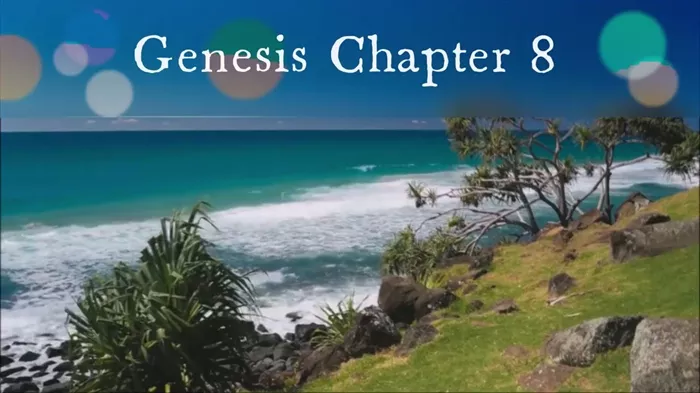Genesis Chapter 8 Summary
Genesis Chapter 8 describes the events following the Great Flood, marking the renewal of the earth and God’s covenant with Noah. The chapter begins with God remembering Noah and all the animals in the ark, causing a wind to pass over the earth, which gradually subsides the waters. After 150 days, the ark comes to rest on the mountains of Ararat. Noah sends out a raven, which flies back and forth until the waters recede. He then sends out a dove, which eventually returns with an olive leaf, signaling that the floodwaters had receded. After waiting further, Noah finally exits the ark at God’s command. Noah then builds an altar and offers sacrifices to God, who is pleased and promises never to curse the ground or destroy all living creatures by flood again. The chapter concludes with God establishing the cycle of seasons and the continued existence of life on earth.
Bible Genesis Chapter 8
Welcome to read Genesis Chapter 8. Here is the list of Genesis Chapter 8:
What Does Genesis 8 Teach Us?
1. God’s Faithfulness:
Genesis 8 reveals God’s faithfulness to His promises. After the flood, God remembers Noah and takes action to begin the restoration of the earth. This remembrance is not a matter of God forgetting and then recalling Noah, but rather it emphasizes God’s continual care and intention to fulfill His promises. It teaches us that even in times of judgment, God is faithful and will bring about restoration in His time.
2. The Power of Renewal:
The chapter illustrates the theme of renewal. The floodwaters that once covered the earth subside, making way for new beginnings. Noah, his family, and the animals emerge from the ark into a cleansed world, symbolizing a fresh start for humanity. This teaches us about God’s ability to bring renewal out of chaos and destruction, offering a new chance for righteous living.
3. The Importance of Obedience:
Noah’s obedience is highlighted in this chapter. He waits patiently for God’s command before leaving the ark, even after the land appears dry. This emphasizes the importance of waiting for God’s timing and following His instructions precisely. Noah’s obedience results in the preservation and renewal of life on earth, teaching us that obedience to God leads to blessings and fulfillment of His promises.
4. The Significance of Worship:
Upon leaving the ark, Noah’s first act is to build an altar and offer sacrifices to God. This act of worship signifies gratitude and reverence for God’s deliverance and provision. It teaches us the importance of acknowledging God’s role in our lives and responding with worship and thanksgiving, especially after experiencing His salvation.
5. God’s Covenant with Humanity:
In response to Noah’s sacrifice, God makes a covenant not to curse the ground or destroy all living creatures by flood again. This covenant establishes a new order for the world, reaffirming the stability of creation and God’s ongoing commitment to humanity. The teaching here is that God’s covenants are expressions of His grace and mercy, providing assurance and hope for the future.
6. The Cycle of Life and Seasons:
The closing verse of Genesis 8 emphasizes the continuation of the natural order: “As long as the earth endures, seedtime and harvest, cold and heat, summer and winter, day and night will never cease” (Genesis 8:22). This assures us of the regularity and reliability of the natural world, which reflects God’s sovereign control over creation. It teaches us that while the world was renewed, the cycle of life continues under God’s providence, demonstrating His sustaining power.


